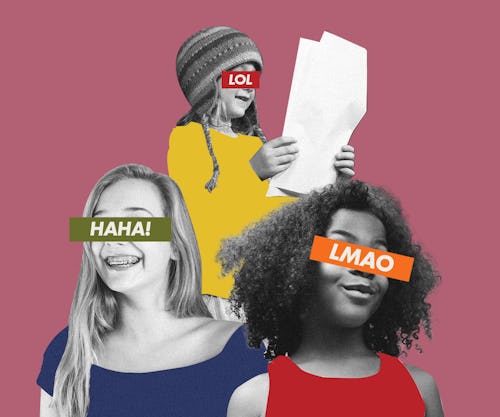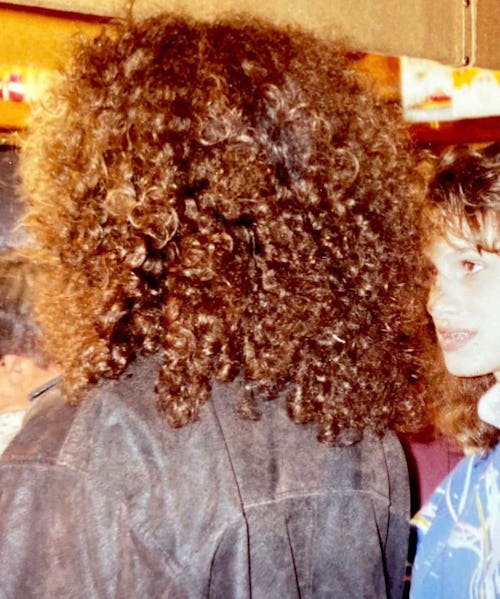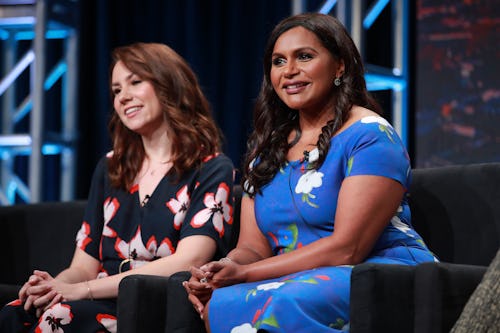
When I was a little girl growing up in Indiana, I had a perm that looked like two poodles making frenzied, furious love to each other. I also had six brothers, who were, I felt, rather disgusting. One of them once used a decorative hand towel when no toilet paper could be found, and then to escape shame, threw the towel out onto our roof. The towel later reappeared on a particularly windy day, when it blew off and landed at the feet of a visiting nun.
This is all a very roundabout way of saying that I learned early on the necessity of a good sense of humor. It was either laugh or spend my days quietly gagging over the actions of my siblings. Humor was a survival mechanism. It was also — I noticed — a way of making my voice heard in a roiling sea of testosterone.
Being funny is often equated with being loud. And the sad truth is that little girls are not always encouraged to “be loud.” We have our “Girl Power!” tees and our “The Future is Female!” totes, but it often feels like “loud” is still considered the domain of men and boys. And when little girls are loud or demanding? It’s something deemed worthy of a TikTok trend.
Now, more than ever, girls need to be taught that their voices matter. This doesn’t happen by accident.
As girls get older, the impulse to speak up and be heard starts to decrease. “Between the ages of 8 and 14, girls’ confidence levels nose-dive by 30 percent,” one study concluded. Self-confidence of girls drops dramatically in puberty for all of the reasons you’d expect: the tumult that comes with body changes, a desire for perfectionism, and a fear of failure.
Could comedy be the key to changing this? OK, I must admit, just typing that made me laugh. We’re living in a time where women’s reproductive rights are being dumped in the trash and set aflame, and where we must repeatedly watch male super creeps rise out of their creep pits to receive golden awards and accolades. So the idea of a tight five saving the day maybe sounds a bit... ambitious. But, as Midge Maisel once said, “Comedy is fueled by oppression, by the lack of power, by sadness and disappointment, by abandonment and humiliation. Now, who the hell does that describe more than women? Judging by those standards, only women should be funny.”
One thing is for certain: Now, more than ever, girls need to be taught that their voices matter. This doesn’t happen by accident. And for many it doesn’t even happen with encouragement of the more straight-ahead variety. But what if we try to teach girls how to nurture their inner Amy Schumer?

Contrary to popular opinion, being funny is a skill that can be taught — or at the very least developed. Let’s start with Lynn Harris, founder of Gold Comedy, a comedy school and community, and content studio for women, girls, and nonbinary folks. Gold Comedy is a place for the “comedy committed,” says Harris, those wishing to make an actual career of comedy. But it’s also for the “comedy curious … those who just like comedy, and recognize comedy as a life skill.” And Harris firmly believes in comedy as a life skill: “Comedy is power, because when you make people laugh, you make people listen.”
While Gold Comedy is now multigenerational, with members of all ages, Harris initially founded the school with teen girls in mind. A longtime comedian herself, she was often the only woman performing in a club. “If you look historically at who has controlled and dominated comedy, it’s white dudes,” she says. “They’ve had a monopoly on that power. And even though things are changing, I want to accelerate that change. The more women do comedy, the more women define comedy. And more funny women starts with more funny young women.”
Harris recalled for me a recent fourth-grade birthday party that she attended. The birthday boy had requested a stand-up to perform, and Harris had helped the parents book a comedian, someone who just happened to be female. After the comic’s set, she invited the birthday guests to come up and share a joke in the microphone.
No girl would get up at the mic and not be prepared. We’re too conditioned to be like, ‘You got to get it right. Don’t do it unless it’s perfect!’
“None of the girls came up. Not one,” Harris sighs. “Meanwhile, some of the boys would get up before they even knew what they were going to say, and would just stand at the mic giggling. But not the girls. Does it mean there’s something wrong with the girls? No. It means there’s something wrong with the culture. No girl would get up and not be prepared. We’re too conditioned to be like, ‘You got to get it right. Don’t do it unless it’s perfect!’ We’re not trained to be goofballs. And these kids had literally just had a female comic in front of them telling jokes!”
Harris hopes Gold Comedy can help change that. Along with classes, the school also functions as a sort of online club — a safe space for everyone to try and fail and try again. “Comedy increases confidence, and smashes perfectionism,” Harris says. “It also gives you a way to deal with the tough stuff.”
And Harris is right: Comedy can be a survival skill, a way of dealing with the difficult blows life sends your way, which, for an adolescent girl, can be particularly nasty, as they often are directly related to one’s physical appearance. Writer Julieanne Smolinski (who helped write and co-producer the stellar series Grace and Frankie) shared with me that she was one of those kids “who developed a sense of humor out of necessity”: “I moved around a lot growing up, and the one thing my ever-divorcing parents ever agreed on was that it was important to dress their 8-year-old like a paralegal in deep menopause. I was nearsighted, I had a bone deformity and weird teeth. I definitely used humor for survival before it became ‘fun’ per se.”
Smolinski said there was a kid on her block who — charmer that he was! — called her “horse.” And one morning, he went so far as to fill a paper bag with oats and bring it to the bus stop to taunt her with it in front of the other kids.
“At the time of course, I was liquefied with shame,” she says. “But if you think about it, I should have just pointed out, what kind of stone-cold dweeb brings a prop? You made time between homework and hockey practice and having what I assume is a bad relationship with your dad to make a mean craft? And I’m the one begging my mom to let me transfer schools?”
Beyond self-defense, comedy can also be a path to leadership. Jenny Raymond helped found Funny Girls, an organization that helps educators use the tools of improv to shape leadership skills in third- to eighth-grade girls. The impetus for the project came after reading an article in The New York Times where someone was quoted as saying that women aren’t electable because they aren’t funny. It was something that resonated with Raymond, as she clearly recalled her own childhood run for student council. “I had a long speech detailing a list of everything I would do,” she says. Meanwhile, her male opponent got up, made one dumb Star Wars joke, and ended up winning the election.
We discovered that 9 out of 10 girls thinks anyone can have leadership skills, but only 1 out of 5 thinks that she has them.
“There’s a symbiotic relationship between warmth and strength,” Raymond explains. “And when you think about learning leadership skills, lots of things are oriented for women around strength. But this idea of building a natural presence … had I just been myself up there that day and said things in my own voice, it might have been a different story. But I was constricted by what I thought I should sound like.”
To launch Funny Girls, Raymond consulted comedians, child development specialists, and teachers. “We realized this confidence gap with girls starts rearing its head between the ages of 8 and 13,” Raymond says. “We discovered that 9 out of 10 girls thinks anyone can have leadership skills, but only 1 out of 5 thinks that she has them. It’s this thing of, sure, anyone can be a leader. Just not me.”
At Funny Girls, the participants are led through a series of improv exercises, then asked to reflect on the experience. One example Raymond gave was a game called “Dolphin Trainer,” where one girl pretends to be the dolphin, and the other is the trainer. But they aren’t allowed to speak. The trainer must somehow communicate to the dolphin the trick she wants her to perform without using words. As you might expect, it can get pretty silly. “Someone always ends up rolling around on the floor,” Raymond laughs. But after the rolling around, etc., the girls are asked to debrief with writing exercises, and discuss their takeaways.
“We give boys all of this leeway to be irreverent and silly. So I try in my parenting to let my girls have the same space.” —Tracey Wigfield
“It brings home this idea that they cannot keep doing the same things over and over, just louder and bigger, and expect different results,” Raymond explains. “They have to explore going high, going low, trying all of these different pivots. It’s a lesson in resiliency. And it’s really wonderful seeing the girls do it and having fun, and then having these aha moments. They make the connections, and connect that skill to themselves and to leadership.”
At the end of the program, the girls put on a showcase for friends and family, and share what they’ve learned. “They say things like, ‘I didn’t know I had it in me! I didn’t know I had something to say like this,’” Raymond says. “And that’s the underpinning of it all, this idea of having something to say. Hearing that, I mean, our hearts are full. That’s what we’re here to do, to change that perception of self, into ‘I am a leader, and I have something to say!’”

Of course, not everything a girl has to say will be a groundbreaking emotional insight or thoughtful declaration of the self. Sometimes girls just want to make a butt joke. Comedy writer Tracey Wigfield has written madcap hilarity for the likes of 30 Rock and The Mindy Project, but she admits that as a mom, she still sometimes has the urge to censor her little girls. “Having daughters myself, they’re always saying disgusting things, and there’s an impulse to say, ‘Don’t say that!’” Wigfield says. “But I think with girls especially, it can be good to try and quiet that voice as a parent, and let them say what they want to say. I don’t know if that will result in my children being monsters or shock jocks on the radio or something. But we give boys all of this leeway to be irreverent and silly. So I try in my parenting to let them have the same space.”
How to Help Nurture Your Girls’ Funny
Along with classes and clubs, there are other small ways to help cultivate your daughter’s comedic voice, and that of course would be by injecting a few choice tidbits into her media diet. Exposing girls to classic, female-driven comedies can be a great way to share a hilarious little history lesson. And I don’t just mean the standard go-tos, like Mean Girls and Bridesmaids. Screening some classic comedies, like Private Benjamin, or 9-5, can give a real sense of how women have always used comedy as a means of pushing back.
And of course, there are books! There’s Funny Girls, a middle-grade anthology featuring “a collection of uproarious stories, rollicking comics, rib-tickling wit, and more, from 25 of today’s funniest female writers for kids.” It has chapters with tips on how to tell a good joke, funny comic strips, and just random stories of siblings getting Tic Tacs stuck in their noses.
There is also the adorable and uplifting Ginger Mancino, Kid Comedian, a middle-grade book about a tween stand-up who uses comedy as a means of navigating the challenges of middle school. It was written by my pal Wendi Aarons, whose quips and musings you have probably come across via Twitter. Aarons says that when she was approached about writing a middle-grade book, she knew immediately that she wanted to create a funny, awkward, girl character: “Someone who I would have embraced as a kid.”
Aarons told me one of her favorite sayings is, Don’t get mad, get funny. “It means that you can use your comedic voice to speak your truth and shed light on wrongdoings, much like comedians Wanda Sykes and George Carlin did,” she explains. “That sounds a little woo-woo, but it’s related to one of my other favorite sayings, ‘Humor is a rubber sword, it makes a point without drawing blood.’”
And it’s true. The ability to make others laugh — or to laugh at oneself — can be both a sword and a shield. In a world where one never knows when a desecrated hand towel might blow down around your ankles, or when some jerk might shake a bag of breakfast cereal in your face in an elaborate attempt to mock your dental malocclusion, laughter can be a lifeline.
0 comments:
Post a Comment